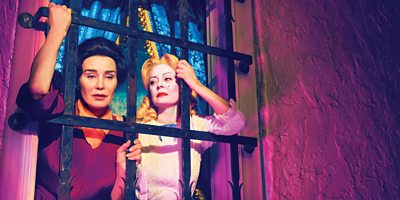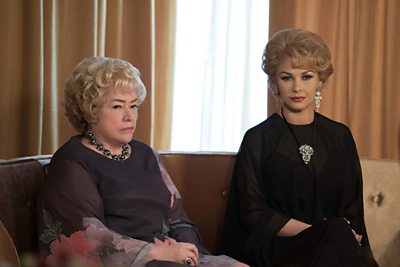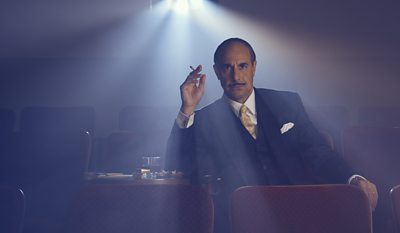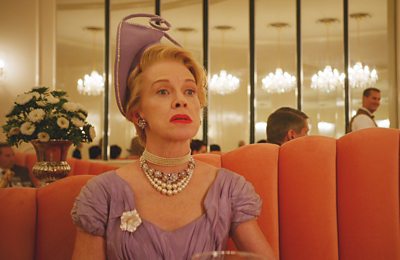The Emmy and Golden Globe nominated Feud: Bette and Joan tells the story of the rivalry between Hollywood legends Bette Davis and Joan Crawford and the making of the film Whatever Happened to Baby Jane? We spoke to the show's writers, Michael Zam and Jaffe Cohen ahead of its UK debut on BBC Two.
What was the origin of your writing partnership? Is this the first thing you’ve worked on together? How does it work, do you actually sit and write together or work separately on different parts of the script and then edit the other’s work? Do you bring different strengths?
We’ve been friends for decades and our writing partnership evolved naturally because we’re passionately interested in so many of the same things: writing, teaching, history (especially Hollywood history!). More than that we love spending time together. We collaborated early on with a few ideas for TV shows and worked together on a play, but then mostly went our separate ways for a few decades. Michael taught at New York University and wrote a few screenplays that almost got made on his own. Jaffe primarily did stand up as part of a pioneering trio of comics called Funny Gay Males.
In terms of our process, the best answer is all of the above. We get together and talk…and talk…and talk, working on increasingly detailed outlines of our story. Then one of us usually writes a first draft and we start sending it back and forth. If we’re working on more than one story at a time, which is more and more the case these days, we can literally be emailing drafts of outlines and scenes to each other from across the room, across the city, or across the ocean (as Michael teaches theater in London every summer). In terms of our strengths, we’re both pretty seasoned at this point and, in many ways, have absorbed each other’s strengths and points of view. Perhaps Michael is more focused on the overall story. Maybe Jaffe is happiest finding the drama in individual scenes. But it definitely goes back and forth depending on circumstances and, at any given time, one of us can be the midwife while the other is giving birth. But then, of course, we raise the baby together, polishing and perfecting.

What attracted you to this story specifically?
We were both at a point in our lives when we only wanted to write about subjects that clearly interested us and few things interest us more, as said above, than Hollywood history.
So that led us to Bette and Joan, two of our favorite stars from the Golden Age of Hollywood. At first Jaffe had the idea to write about two women like Bette and Joan, two middle-aged stars who have competed with each other for decades who make their comeback in the same film. And it was Michael’s idea to simply write about the real Bette and Joan. And when we realized that our research would primarily be sitting on a couch and watching all of their best films …well …we simply dived right in.

Is it correct that Feud: Bette and Joan began life as a movie script? What was its journey to an 8 part TV series? Can you explain the Blacklist to a UK audience and how it was picked up by Ryan Murphy?
Yes, we originally wrote Feud as a screenplay called Best Actress which got a lot of positive attention early on from agents, producers and especially from an amazing list of actresses who wanted to play the parts. In 2009 the script made it onto a top spot on the Black List, which is a list of the year’s best unproduced screenplays as rated by producers, agents and managers. Plan B, Brad Pitt’s company, read the script and they thought it would be perfect for Ryan Murphy who at the time was looking to a feature film. But this was also the year Murphy’s TV show Glee became a phenomenon leading Ryan to work primarily in television.
Three years ago Ryan decided that the best way to tell the story in Best Actress was to keep the basic structure of the screenplay but expand it into eight hours of television. At this point we were brought on as producers and writers and began offering ideas for subplots, many of which we wanted to include in the original screenplay but didn’t have the space, like the character of Victor Buono, an unapologetically gay character actor who co-starred with Bette and Joan in Whatever Happened to Baby Jane?
Is it unusual in the US for a TV series to be ‘authored’ rather than the product of a Writers’ Room?
We believe so, especially with the kind of super talented head writers and show runners currently working in television. Often the plots and subplots are worked out well in advance - whole seasons, multiple seasons! - and then the episodes are farmed out to writers whose job it is to faithfully dramatize the original vision.

Did you have a meeting of minds with Ryan Murphy on the project?
Yes, it was obvious when we met that we all had a very strong connection to the material and we were convinced that Ryan would protect our vision. It was important to us that whoever made it felt strongly about the theme: that it’s tragic how Hollywood tosses aside women at a certain age, no matter what their previous contributions have been to the industry.
You both work teaching screenwriting. What about the story of Feud: Bette and Joan matches the advice you pass on to students? Does it contain those elements that you tell your students make up a successful screenplay?
Yes, thankfully! Mainly we want our students to write about something they love. Characters in our screenplays become our companions so we better like them and want to know more about them! We also emphasize how characters need to have high stakes, and what makes Bette and Joan so fascinating is that they are both fighting for their dignity, their legacy, their futures, and their self-esteem. In other words: their lives. For them, this is the equivalent of life and death. They were also witty, daring and, at moments, perverse. In short, we can’t take our eyes off them!

How do you make this story interesting for people who may not know anything about Bette Davis and Joan Crawford? What about it resonates for today’s audience, especially in the light of recent revelations of abusive behaviour in the industry?
We purposely wrote our original screenplay to hold people’s attention even without ever having heard about Bette and Joan. Our model at the time was the movie, The Queen with Helen Mirren, which worked so well even if you didn’t know or care much (as many Americans don’t) about Elizabeth II. The stakes were so high and the story so specific (as well as often quite funny), it didn’t much matter how much you knew walking into the theater. In fact, some of the people who liked Feud best were people who knew very little about Bette and Joan, but became fascinated by what they actually did, like Joan’s actively campaigning against her co-star when Bette was nominated for an Oscar and Joan wasn’t. So, part of the fun of watching Feud is learning some history, especially when the facts are stranger than fiction. And what these women faced, particularly from the powerful men who did all they could to use and manipulate them, is astounding. Hopefully that’s a pattern that will soon be history.
You have an amazing cast – were you involved in the casting or have to fight for these actresses to be involved?
Ryan mentioned some names when we first met. There were some great actresses who wanted to play Bette, but Susan Sarandon’s name was always at the top of his list. Jessica Lange read the script a little later, but she completely latched onto the idea of playing Joan. And in the years when we weren’t sure if the story was going to be produced, Jessica was the one who kept the project front and center. Needless to say, we were over the moon about all the casting – Alfred Molina, Stanley Tucci - all great. We were really excited about Judy Davis, who we’ve admired from way back in My Brilliant Career. We were blown away when she played Judy Garland some time back on American television. And we adore Jackie Hoffman, who plays Mamacita, and Alison Wright, who plays Pauline, both of whose work we knew well from their stage work in New York, where we live.

What does telling a story as a drama add that isn’t possible in a documentary?
Oh, so much! As writers of historical fiction - as opposed to die-hard historians - our guideline is not what happened, but what could have happened – and what about our characters helped make it happen. Naturally there are guidelines imposed by the known events and the personalities involved. Drama is often described as the lie that tells the truth. In historical fiction, the lie simply needs to be plausible. It has to feel like it could have happened. And if we add to our story a little narration – and narrators aren’t always reliable – we have a pretty wide berth to re-create all the delicious scenes – the private moments, the confrontations - that might have gone unrecorded.

What have you got coming up next? Do you have more stories from classic Hollywood?
You bet and some of our projects take place in Britain! We’re currently working on a project about the turbulent monumental romance between Vivien Leigh and Laurence Olivier. It’s an amazing story about two of the most talented and celebrated actors in the twentieth century who fell madly in love and stuck with each other for two decades of extreme highs and lows.
We’ve also completed a screenplay on William Haines, who was a handsome, funny, sexy leading man in the 1920’s and 30’s – and was openly gay. And we wrote a script that’s a very unconventional, but honest look at Kate Hepburn.

Something else we’re working on is a screenplay about Mama Cass, the brilliant warm-hearted singer who shot to stardom as a member of the Mamas and the Papas and then spent the last few years of her life trying to find her own voice as an entertainer. By all accounts, she finally found that voice, “making her own kind of music” during her last public performance, a two-week gig at the London Palladium, but then dying tragically the next day. See truth really is stranger than fiction. We’ll keep you posted on the casting, and needless to say, we’re dying to get to London to do a little research!
Feud: Bette and Joan begins on Saturday 16th December 2017 at 9pm on BBC Two and BBC iPlayer
Watch interviews with the stars Susan Sarandon and Jessica Lange
More interviews with the cast and the director, Ryan Murphy (who describes how he met Bette Davis)

